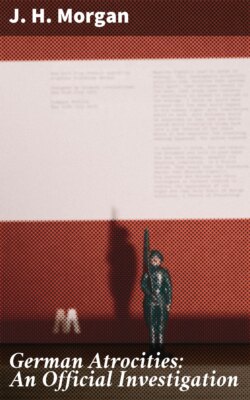Читать книгу German Atrocities: An Official Investigation - J. H. Morgan - Страница 8
На сайте Литреса книга снята с продажи.
Charges against the Belgian Government.
ОглавлениеThe main contention of the German Government therefore falls to the ground. What remains? It is here that the German answer betrays itself by its disingenuousness. There is an old rule of pleading, familiar to lawyers, which says a traverse must be neither too large nor too narrow. This is just the error into which the German contention falls. The apologies are too anxious to prove everything in turn as the occasion suits, forgetting that one of their contentions often refutes the other. In the introductory memorandum they argue that Belgium had time to organise and did not. In their excuse for the massacre at Dinant, and their zeal to prove that the military exigencies were overwhelming, they say that “the organisation”—of civilian resistance—“was remarkable for its careful preparation and wide extent”; “that the guns were only partly sporting guns and revolvers but partly also machine guns and Belgian military weapons proves that the organisation had the support of the Belgian Government.”14 In other words, in one part of the White Book they insist that the resistance was ruthlessly punished because it was not organised; in another that because it was organised it had to be ruthlessly repressed. In another place,15 having to justify their peculiar principle of vicarious responsibility by which the innocent have to answer for the guilty, they say that the Belgian Government and the municipal hostages whom the Germans executed ought to have stopped “this guerilla warfare,” and did not do so. Now it is well known, and the German Government admits it, that the public authorities issued proclamations ordering the people to abstain from hostilities and to surrender their arms. How does the German Government meet this? The only evidence they can produce in the whole of their pompous dossier is (1) the deposition of a German Jew, resident in Brussels, to the effect that, seeing the proclamation, he sent his servant to the Belgian authorities to deliver up a revolver, and that the servant came back and said that the Commissioner of Police had told him not to trouble as “one need not believe everything that is in the papers”;16 (2) the deposition of a German lieutenant that an officer (not named) once showed him a document (not produced), which, “according to his own account” he had found in the town hall of a neighbouring village (not indicated), containing an invitation on the part of the Belgian Government, addressed to the population, to render armed resistance in return for payment.17 On such flimsy hearsay evidence, tendered by two Germans, rests the whole of the German case against the Belgian Government.
